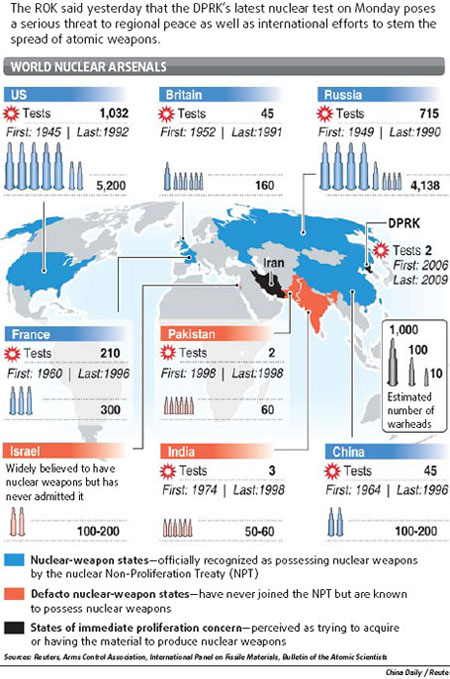
|
WORLD> Asia-Pacific
 |
|
Nuke arms race 'unlikely' in Northeast Asia: Experts
(China Daily)
Updated: 2009-05-27 08:19 TOKYO: The Democratic People's Republic of Korea's (DPRK) nuclear test is unlikely to spark a nuclear arms race in Asia, but analysts say Japan and the Republic of Korea (ROK) may seek to beef up their missile defenses and pre-emptive capabilities against Pyongyang. Pyongyang's second nuclear test came weeks after it fired a long-range rocket that flew over northern Japan, a clear message that the DPRK is developing a nuclear weapon and the means to deliver it. But analysts say the DPRK's actions are defensive, while its neighbors are already under a US deterrent.
President Barack Obama was quick to reaffirm the US commitment to the defense of both the ROK and Japan yesterday, perhaps in a sign of Washington's concern that both countries stay out of the nuclear club. "At the end of the day, what do nuclear weapons buy North Korea (DPRK)?" asked Brad Glosserman of Hawaii-based think tank Pacific Forum CSIS. "It buys them a deterrent. It allows them to say 'you can't come after us'. But I don't see how North Korea can use it to extort anything. It has a limited number of weapons and it has to know that if it uses them, it's 'game over'." Few in neighboring Japan are calling openly for the development of nuclear bombs, though some hawks say the idea should at least be debated. The ROK's biggest daily Chosun Ilbo yesterday urged the government to go nuclear, but analysts say it, too, is unlikely to risk alienating the US by doing so.
 Missile arsenal buildup Instead, Seoul may seek to extend the range of its arsenal of missiles, currently limited to 300 km, in an effort to counter the DPRK's mid-range missiles. "The much more real proliferation risk is that the North Korea test will encourage Japan and South Korea (ROK) to accelerate developing missiles and missile technology," Renimin University's Shi added. "In a Northeast Asia arms race, missiles would be a much bigger risk than nuclear weapons," he said. The test has already prompted a policy change in Seoul.
The ROK announced yesterday it was joining a US-led initiative aimed at intercepting shipments suspected of carrying equipment for weapons of mass destruction. It marked the end of a drawn-out debate in Seoul whether to join a naval exercise that brings together 100 countries worldwide and risks angering the DPRK. Pre-emptive strikes The jumpiest of the DPRK's neighbors is probably Japan, which quickly pushed for UN Security Council action on the nuclear test. Analysts say its jitters may be justified. "I think by far and away the most significant impact of the tests and more broadly the impact of the acquisition by North Korea of nuclear weapons is on Japan," said Professor Hugh White, head of the Strategic and Defense Studies Center at Australian National University. A range of factors, from Japan's 1910-45 colonization of the Korean Peninsula to the DPRK's abductions of Japanese citizens in the 1970s and 1980s, have resulted in rocky ties and cast Japan as a potential victim of any DPRK attack. Japan is also acutely aware of the effects of atomic weapons, being the only country to have suffered nuclear attacks, though its reaction will be limited by its post-war pacifist constitution. Lawmakers in Japan's ruling Liberal Democratic Party (LDP), keen to take a firm stance on the DPRK ahead of a looming election, are instead focusing on the ability to carry out pre-emptive strikes. But politicians and analysts are divided over the idea, which would require missiles or bomber aircraft. "Our country should have the capability to attack missile launch bases to prevent any launch," former defense minister Gen Nakatani told reporters yesterday, a day after an LDP panel was reported to have reached the same conclusion. Current Defense Minister Yasukazu Hamada was more hesitant, saying debate on the issue should be calm and informed, or it risked fanning public emotions, Kyodo news agency said. Past public calls for debate on first-strike capability in Japan have infuriated the ROK and China, where many suffered under Japan's colonial rule in the early 20th century and are sensitive to any sign of rising military might in Japan. Reuters |